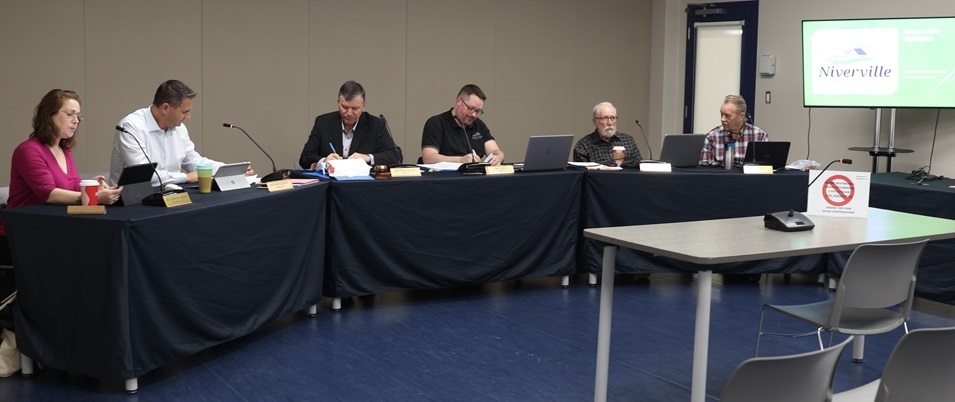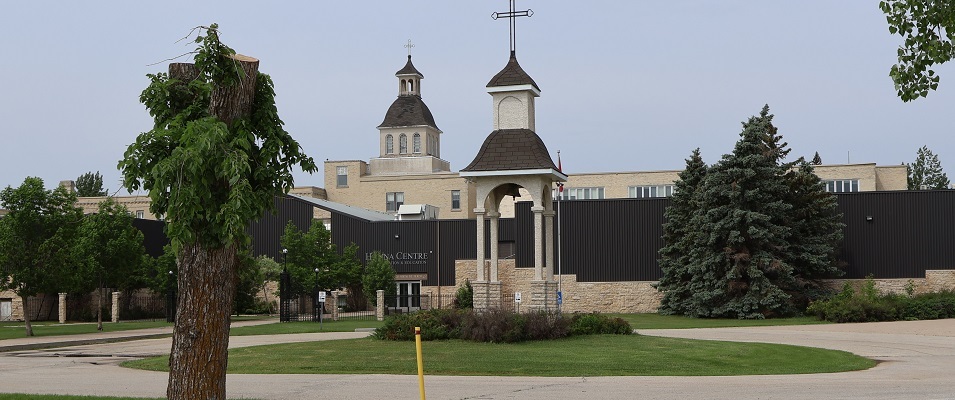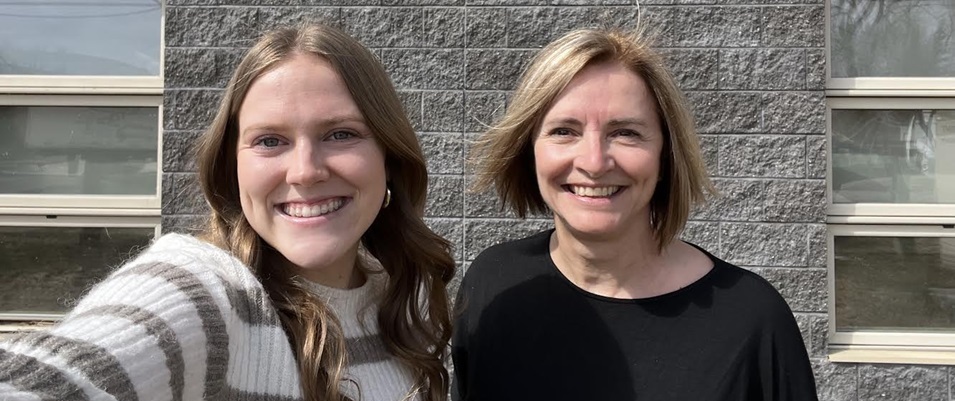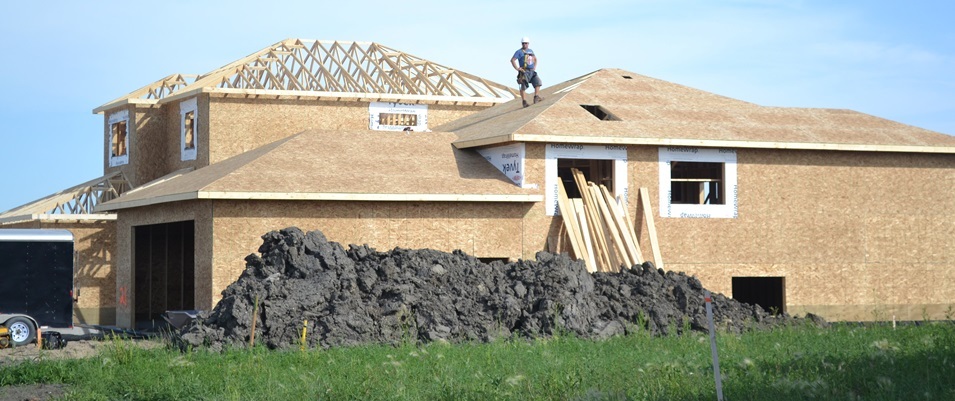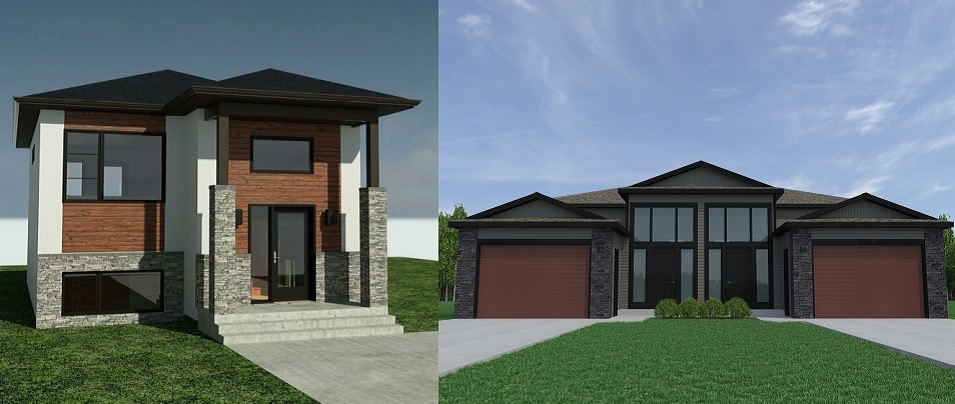
The Town of Niverville recently approved the development of smaller residential lots. Consequently, smaller houses are now on the way in The Highlands. The new houses will come in at approximately 675 square feet on the main floor, offering a new level of affordability to those looking to move to Niverville.
“We have a fairly large development here, and in any good development you should have many different styles or types or prices of houses,” says Len Peters of Sunset Estates, the developer behind The Highlands. “We’ve got the big walkout lots backing onto the ponds, and in Highlands Village we’ve got more of the four-, five-, and six-plex townhouses that we offer. Then we have ‘normal’ lots. They’re not walkouts; they’re flat lots in a variety of sizes, with smaller lots coming in around 40 to 50 feet wide… But now, in this portion of the development, we are trying to hit a lower price point still.”
The town had previously approved the smaller lot size, but Sunset Estates then required a variation to propose house plans smaller than what was previously zoned for in The Highlands. At a council meeting on February 2, council approved the smaller house plans.
Peters says that with the increased cost of building materials related to COVID-19, there is a need to present lower prices for people to be able to buy houses.
“We’re trying to get the price point down for people who would not be able to buy otherwise,” he says. “There’s always going to be a demand for affordability, no matter if times are good or times are bad. People need affordability. Now, that means something different to everybody, but people need to be able to afford to buy a house. We’re trying to fill a bit of that demand in Niverville.”
Big Demand for Small Homes
The types of homes proposed by Sunset Estates will be small, and small is sometimes perceived as being less valuable and therefore less desirable.
“Affordable means something different today,” Peters says. “It doesn’t mean low end. Everybody needs a house they can afford. For most people, that number is lower than half-a-million-dollar homes.”
With years of experience in the housing game, he says that having a versatile development leads to finished neighbourhoods where people can purchase, live, and pay taxes, which can drive up property values—as opposed to neighbourhoods with larger lots that may remain unsold or vacant.
“I’ve been doing this for 17 years and I hear that complaint all the time,” he says. “Whenever you want to do a development when you have smaller houses or duplexes, people show up and the concern is, it’s going to bring my property value down. And it’s never been the case. I’ve never seen it before… it’s not reality.”
Affordable housing is also sometimes called entry-level housing. Peters says a smaller home with a lower price point is a smart purchase and is often the most effective way to enter the housing market for the first time.
“The biggest thing that keeps someone from buying a house for the first time is the down-payment,” he points out. “Monthly rent is often more expensive than a mortgage payment, but people have trouble coming up with the down-payment to get out of their renting situation. Everybody needs that first house. Some people don’t have the help for a down-payment to move directly into middle-income-level housing.”
He also points to the underlying unfairness of essentially telling someone they’re not allowed to live in a town because their starting price point is too low.
“It doesn’t make them a bad person or a bad neighbour; it just means maybe they don’t have a parent or grandparent in a financial position to easily step up and help give or loan them the money. This is often a professional person, but they still might not be able to save enough in their monthly expenses if they are renting to afford the lumpsum of a 15 to 20 percent down-payment.”
Entry-level housing purchasers are often young professionals who want to start a family, in which case they may need to get by on a single-income for a while. And many single people are prospective buyers for small homes.
“I’ve done entry-level housing before and it’s been a great success,” says Peter. “There’s a big demand for this type of home. You see young families purchasing and you get young people moving in with a kid or two. You get professionals, nurses, teachers, engineers. Maybe they’re single and don’t have a second income to support a house, but they realize they don’t need it either.”
Peters says that these young people may eventually want to upgrade and move into bigger homes, but an attitude of permanence is still possible in these neighbourhoods.
“You won’t get a lot of turnover right away,” says Peters. “Maybe it’s the stepping stone and they build equity in the home, and then in five to six years, when property values increase, they are able to sell and move into the next level of home. In this case, they will upkeep the home in order to make as much money as possible. People are also buying and staying. There are people who don’t want a large house and yard and never will. They are looking to start small and stay small. Or there are older people who are looking to downsize; they are looking to benefit from freeing up some income and they will enjoy their smaller home.”
The council meeting in early February registered zero objections to the small homes, but Peters says he’s seen it before where a developer faces backlash from the existing neighbours for introducing a variance to the original plan. In The Highlands, he says the timing was good and there aren’t a lot of neighbours nearby who would object to the changes.
But Peters isn’t shy about using his experience from all over southern Manitoba to send a message to dispel prejudice about small homes.
“The people who buy small homes are not bad people. They are not bringing property values down. And just because it’s new to your perception of housing doesn’t mean it’s a new idea to residential development and doesn’t mean it’s detrimental to a development.”
More than a Bedroom Community
There are many different approaches to community building. In Niverville and other surrounding municipalities, it’s been shown that a variety in sizes and types of housing create a net positive for the community, both in property value and social health.
As a past chair of the Economic Developers Association of Manitoba, Marilyn Crewe is an expert in community development and currently works as the economic development officer for the town of Neepawa. Like Niverville, Neepawa recently saw a period of intense growth with housing going up 27 percent from the last year. Neepawa’s community vision includes housing for persons and families from a variety of socioeconomic backgrounds.
“We need to be careful, because there is no cookie-cutter solution,” says Crewe. “Every community’s housing will grow to what the community needs. To assume every community needs five percent seniors housing, ten percent low-income housing, etc… there is no exact formula. Having said that, multiple levels of affordability and multiple styles of homes should be addressed at the planning stage to ensure a community does have a good mix, unless you only want upscale, single-family homes on large lots, and that then could be a strategy for a community. But then you would only attract what would amount to be a bedroom community to Winnipeg.”
Crewe points out that if you want to be more than a bedroom community, variety is needed. Having a variety of housing types means your community can grow without relying on a nearby city for social supports, education, medical services, and recreation.
“If we want families to come, to stay, to live, to grow, and to age into care, we have to have variety,” she says. “If we want a diverse community, we have to have diverse housing. It is that simple.”
The Goal: Economic Diversity
According to Niverville mayor Myron Dyck, the town’s goal is to try to be more inclusive. When council conducts its planning, they tend to focus on the economic diversity of the general population as being a positive.
“If a community is truly to be a community, one should have housing to meet all, or as many as possible, of people’s needs and wants,” Mayor Dyck says. “If we can offer choice, where the buyer maybe wants to downsize, or a buyer simply does not want or need a large place to live but instead wants a detached home rather than a condo or attached home like a duplex or townhome, we want to provide that whether it’s a matter of affordability or preference.”
He also says that the types of builds are up the developers they’re in contact with, and for business reasons developers are looking for what they know they are able to sell.
“If a developer does not see a profit in certain types of housing, they will not build it,” Mayor Dyck adds. “Council can encourage certain types of housing and press for the social good, but at the end of the day a developer is a business.”
The role of government, he says, is merely to offer a measure of guidance through zoning bylaws, determining a minimum house size and lot size.
Peters from Sunset Estates says that he sees both the social and commercial benefit when a community is developed with an eye toward economic diversity.
“You can’t, or shouldn’t, build a development that just caters towards one income bracket,” Peters says. “If you did, it would be a disaster. A good community is a mix, with a bit of everything. That’s a thriving community. You need different types of people. Homogenous people groups aren’t good. Not everybody is the same and not everybody can afford the same… And if you just make a development for one type of people with one type of house, you’re not going to sell all the houses. You’re only going to sell a fraction of the lots. Nobody likes an empty development. Affordability at all levels is what works.”
Details and Pricing (Updated)
The lots for these new small homes are currently being serviced at the far southeast corner of The Highlands along Murcar Street. There are two styles of home being built, both with two bedrooms and one bath.
One is a single-family home with no garage, with 664 square feet of living space on the main floor, plus a fully finished basement. This home is being priced at $279,900.
The second plan is a side-by-side with a garage, with 1080 square feet, also with a finished basement. This home is priced at $319,000.
In total the development will feature 38 single-family homes, many of them with a lake view, and 16 side-by-sides. The builds are projected to start in July 2021.





